
Nonprofit Boards And Planning Learning
Embark on a journey of mastery in board governance and strategic planning with our selected collection of educational videos– tailored exclusively for nonprofits. Venture into the intricate dynamics of board management, from recruitment and retention of effective board members to nurturing a culture of engagement and mutual respect. Explore the heart of strategic planning as nonprofit experts share compelling visions and means to devise actionable plans, and implement them successfully. You’ll learn how to synergize your board and staff and align them towards common goals and objectives. Whether you’re a newly formed nonprofit seeking structure and new board members or an established organization aiming to streamline processes and enhance impact, these inspiring learning sessions will give you a wealth of resources.
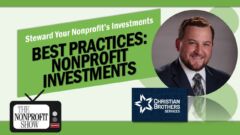
The Chief Investment Officer at Christian Brothers Services, Steve Sliwinski, offers a highly approachable yet technically sound guide to nonprofit investment strategy. With decades of financial experience and dual designations as CFA and CAIA, Steve breaks down how organizations—regardless of size—can begin managing and growing their financial assets responsibly.
From policy benchmarking and committee structure to modern investment tools and trends like IP transfers and crypto, Steve’s insights will help demystify what can often be an intimidating subject. This episode is a must-watch for boards, CFOs, and executive leaders seeking clarity on how to begin—or refine—their investment approach.
The discussion begins with a history of Christian Brothers Services, which evolved from a cooperative model among Catholic schools into a nationwide provider of retirement, insurance, and investment services for thousands of institutions. This story serves as an example of scalable collaboration and strategic vision, offering NPO’s a compelling model for shared resource management.
Steve explains that waiting for a major windfall to begin investing is outdated thinking. “It’s certainly not out of reach to create a well-diversified portfolio with under $100,000,” he shares, emphasizing that even small recurring contributions—like payroll-deducted retirement savings—can grow into substantial assets over time. The message: nonprofits don’t need to be large to think long-term.
Much of the conversation centers around the role of the investment committee. Steve offers a fresh take, stating that technical expertise isn’t always necessary. What matters most is “a long-term orientation and strategic mindset.” Ideal committee size? Three to seven individuals with high-level focus, not necessarily financial professionals.
The conversation, with host Julia Patrick, continues into policy development and investment alignment with mission. Steve discusses how ESG (environmental, social, governance) or values-based screening—once costly—is now affordable and feasible even for small organizations. He encourages nonprofits to create an investment policy document in partnership with a consultant or a platform like Vanguard or Fidelity to ensure thoughtful, repeatable decision-making. He stresses the importance of sticking with the strategy through market fluctuations: “Set the policy at the beginning, know why it exists, and abide by it—especially in difficult times.”

Jeffrey Wilcox (President) and Joan Brown (COO) of the Interim Executives Academy unpack the harsh realities of nonprofit leadership turnover—and the game-changing role of interim executives.
Jeffrey starts this lively session with. . . “Interim leaders aren’t temps—they’re bees, cross-pollinating wisdom to prepare organizations for their next leader.” Joan Brown backs it up, revealing why first-time nonprofit CEOs crash and burn—often due to unclear job expectations, chaotic HR structures, and boards that operate like secret societies instead of partners.
This bouyant conversation with host Julia Patrick, gets real fast:
HR disasters are the #1 reason leaders get fired—think vague job roles, favoritism, and financial denial.
Boards scare new execs by locking them out of meetings instead of mentoring them.
Interims aren’t just placeholders—they’re strategic fixers who spend 9–12 months prepping orgs for long-term success.
Looking ahead, Jeffrey and Joan warn nonprofits: “If you’re only relevant to yourself, you’re already dying.” The future demands sustainable leadership, emotional intelligence, and ditching outdated board models that hold orgs back.
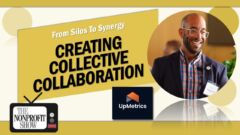
Stephen Minix—VP of Community at UpMetrics—lays bare the myth that collaboration simply “happens” in the nonprofit sector. His assertion is sharp: “If I can cut the check, I can set the terms.” This statement cuts to the core of a sector that talks community but often operates in silos defined by funding power dynamics and compliance culture.
What emerges in this conversation is a compelling argument for a wholesale reframe of how nonprofits and funders work together. Collaboration, Stephen insists, isn't a mood or a moment—it’s a skill set that demands communication, clarity, and most of all, pre-work. Too often, organizations show up to collaborate without knowing what they’re actually prepared to give up, or what success even looks like in shared terms. “You can't play social impact ping-pong by yourself,” he notes. “You need a partner to hit it back.”
But this episode goes even deeper. Stephen challenges the performative elements of both philanthropy and nonprofit operations—conferences, reports, retreats—suggesting they often mask the hard reality: without time, trust, and aligned incentives, collaboration is nothing more than theater.
He offers practical alternatives. Funders should meet nonprofits in their spaces. Trust-based philanthropy, he says, doesn’t mean abandoning data—it means letting the nonprofit define what success looks like and equipping them with the tools to track and tell their story. It’s not about validation. It’s about learning.
Perhaps most powerfully, Stephen reframes trust as a proxy for risk tolerance. Real trust means relinquishing control—something many funders still find difficult. “We don’t wait till the end of the year to decide if our kids can read,” he says. “So why do we wait to uate nonprofit impact in annual reports?”
This episode doesn’t offer easy answers—but it does offer a framework for harder, more authentic conversations. It’s a must-watch for anyone tired of sugarcoated collaboration and ready to commit to real change.
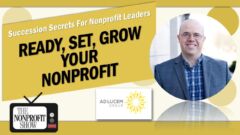
In an era marked by organizational strain and evolving workplace expectations, leadership must move beyond traditional fixes and embrace systemic transformation. Patrick Farran, PhD, MBA, co-founder of Ad Lucem Group, joins host Julia Patrick to dissect the true nature of burnout, succession, and sustainable engagement in nonprofit leadership.
Patrick challenges the prevailing assumption that burnout stems solely from overwork. “The number one cause of burnout is not overwork—it’s the loss of agency,” he explains, arguing that without autonomy, even meaningful work becomes draining. Rather than defaulting to micromanagement during times of stress, Patrick advocates for building cultures rooted in trust, purpose alignment, and shared responsibility.
Drawing from decades of executive coaching and organizational consulting, Patrick offers a framework built on three pillars: personal legacy, building others, and systems thinking. His advice is clear—leaders must be deliberate about cultivating capability in others and embedding processes that outlast any individual. This approach not only fortifies the organization but reduces the high failure rate of executive transitions.
He also introduces the concept of “job crafting,” citing research on hospital janitors who redefined their roles around meaning rather than task lists. This practice, when applied in nonprofit settings, can create clear pipelines for succession and foster resilience.
Another key theme is the embrace of constructive conflict. Patrick quotes Adam Grant: “The absence of conflict is not harmony—it’s apathy.” Healthy disagreement, he argues, is not a threat but a catalyst for innovation. Nonprofits should harness this energy to align purpose, improve communication, and prepare for inevitable turbulence.
Finally, Patrick outlines how appreciative inquiry—a strength-based framework—can transform leadership conversations and shift organizations away from crisis reactivity. By examining moments of excellence, teams can uncover hidden systems of success and replicate them in difficult times.
From strategic succession planning to reframing burnout and conflict, this episode is packed with research-backed guidance, timely analogies, and field-tested leadership philosophy. It’s a must-watch for nonprofit leaders dealing with today’s pressures. Follow the ongoing conversation at #TheNonprofitShow
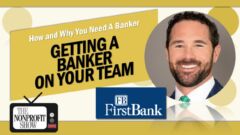
Our hosts chatted with Jeff Young, Senior Vice President at First Bank, about why your nonprofit absolutely needs a good banker—and it's probably not for the reasons you think. Jeff breaks down exactly why banks see nonprofits as desirable clients and how having a strong relationship with your banker can open doors to some unexpected benefits.
Jeff shared that banks don't just see nonprofits as checking and savings accounts; they genuinely want to support organizations doing good in their communities. Surprisingly, there's even federal encouragement under the Community Reinvestment Act (CRA), where banks get ratings for their community engagement—so working with nonprofits actually helps banks, too. "Good banks want to do good for their communities," Jeff explains, "and what better way to do that than support the organizations that actually have boots on the ground?"
But how do you make sure you're getting the most out of your banking relationship? Jeff emphasized asking the right questions—especially whether your bank has experience specifically working with nonprofits and if they offer special products like discounted fees and preferred rates. Also crucial is finding someone at the bank who genuinely believes in your mission. Jeff mentioned that bankers who truly connect with your organization's purpose will become internal advocates, helping secure better deals and even promoting your cause within their network.
Should your banker join your nonprofit's board? It's possible, Jeff says, but proceed carefully. He highlights the importance of maintaining clear boundaries to avoid conflicts of interest, especially when it involves lending and financial incentives. A better practice might be for the banker to provide advice while another team member handles specific transactions.
Jeff also clarified the roles of various financial professionals on nonprofit boards, explaining that accountants look at historical financials and compliance, investment professionals focus on asset management, and bankers are forward-looking, helping nonprofits strategically plan growth and manage risk. Having these diverse perspectives ensures stronger decision-making.
Lastly, Jeff gives practical advice for organizations looking to deepen their banking relationships. Start with your local branch manager, ask about nonprofit-specific services, and leverage LinkedIn to find bankers already active in your community. He also encourages tapping your current board's network, as existing members often have strong banking relationships that can benefit your organization.
The conversation wraps up with an engaging look at best practices for nonprofit financial management, highlighting that proactive, relationship-based banking is always better than reactive scrambling when problems arise. By building solid relationships with bankers early, nonprofits can secure more than just financial support—they gain committed partners who are truly invested in their success.
00:00:00 Introduction to Jeff Young, First Bank
00:02:28 How banks specifically support nonprofits
00:03:42 The Community Reinvestment Act and bank incentives
00:06:55 Importance of asking your bank the right questions
00:08:36 Top questions nonprofits should ask their banker
00:10:27 Should your banker be on your nonprofit board?
00:13:17 Differences between accountants, bankers, and investment advisors
00:15:36 Building relationships with your banker
00:17:59 Leveraging your current board for banking connections
00:20:25 Navigating conflicts of interest with bankers
00:22:46 Managing multiple bank relationships and risk
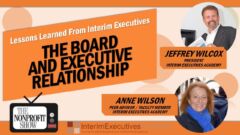
When a nonprofit reaches a pivotal moment of transition, the question arises: who will guide it through the unknown? Jeffrey Wilcox, President of Interim Executives Academy, and Anne Wilson, Peer Advisor and Faculty Member, share the wisdom earned from years of navigating the space between permanent leadership.
Jeffrey opens with a profound reminder: "The mission is the navigation piece. Our partnership delivers on that mission." His emphasis on 1) clarity, 2) culture, and 3)character forms the backbone of what makes the interim-board relationship not just functional—but transformative.
Anne brings lived experience as both an interim and a mentor. "There’s a liberation in being an interim,” she says. “It’s not forever—and that gives you the freedom to recalibrate an organization with truth and transparency.” Her belief in candid communication, mutual accountability, and role integrity sets the stage for a purposeful engagement.
The conversation turns toward common missteps—particularly the temptation for boards to see interims as tryouts. Both guests agree: this misses the opportunity to evolve, a word they purposefully use instead of “change.” Jeffrey explains, “Organizations that feel like they need to change create a different culture than those excited to evolve.”
They also dive into the relationship between the interim executive and the board chair, revealing that this duo can either ignite or impair progress. Jeffrey argues that "a board chair must steward content, culture, and character" and if that role is undefined or misaligned, the interim shouldn’t accept the post. Anne reinforces the necessity for weekly check-ins, early engagement, and shared urgency.
Both guests stress the unique modeling opportunity an interim provides—not just in delivering outcomes, but in demonstrating behaviors: listening deeply, planning incrementally, and celebrating progress. “We want data. We want truth. We want to speak with authenticity,” Jeffrey says, urging boards to shed fear and welcome honesty.
Whether you're a seasoned board member, an interim executive, or a curious observer of nonprofit leadership, this elevating conversation offers a roadmap to rebuild, recalibrate, and evolve. It doesn’t just make the case for interim leadership—it makes the process feel both practical and full of possibility.
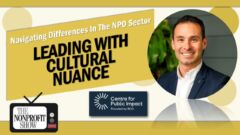
Dr. Pierre Berastaín, Regional Director at the Centre for Public Impact, invites us into a powerful conversation about leadership, cultural humility, and living with integrity across lines of difference. With warmth and depth, Dr. Berastaín shares how personal identity can be a source of strength in leadership—not something to minimize or check at the door.
"We all lead from a cultural lens, whether we name it or not," Dr. Berastaín explains. "The danger isn’t bringing your culture into leadership—the danger is bringing it in unconsciously and expecting it to be the norm for everyone."
Dr. Berastaín’s personal journey fuels his systems change work. His role at CPI—a nonprofit incubated by Boston Consulting Group—blends macro strategy with community-rooted implementation. The goal: reimagine how governments and public institutions serve people, especially those pushed to the margins.
At the heart of this discussion is an honest reckoning with cultural difference and a plea to bring one's full self into leadership. “Cultural humility isn’t about shrinking yourself,” he shares. “It’s about knowing yourself well enough to make room for others.”
The conversation explores what it means to acknowledge culture without stereotyping, the impact of asking, “What are you?” and how silence—intended to be safe—can sometimes feel like erasure. Dr. Berastaín advocates for “relational warmth before analytical interest,” encouraging listeners to shift from tokenizing curiosity to reciprocal connection.
He also offers practical tools for introspection: therapy, spiritual grounding, and forming a “personal board of directors” who challenge and support growth. These elements, he says, are vital in cultivating not only emotional intelligence but the capacity to lead with vision.
By the end of the chat, with host Julia Patrick, it’s clear that Dr. Berastaín’s leadership is not performative—it is personal, deliberate, and anchored in truth. And he challenges all of us to ask: What are we carrying into the room?
This episode is a must-watch for nonprofit professionals, board leaders, and changemakers looking to lead with depth and humanity in today’s increasingly complex world.
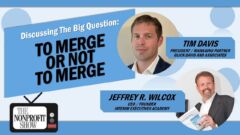
Nonprofit mergers and acquisitions aren’t a sign of weakness—they're a powerful strategy for long-term viability and community impact. In this leading edge conversation, we bring together two sector leaders: Tim Davis, President and Managing Partner of Glick Davis and Associates, and Jeffrey R. Wilcox, CEO and Founder of Interim Executives Academy. Together with host Julia Patrick, they chart a bold roadmap for organizational transformation through strategic partnerships, timely interim leadership, and cultural integration.
As Jeffrey begins, “A sustainable nonprofit must first be viable. And to be viable, you must be survivable.” He challenges nonprofits to move beyond survival thinking and embrace strategic collaboration before financial or leadership crises strike. Tim Davis builds on that, offering a real-world example of three regional nonprofits merging their missions to secure larger grants and extend their reach: “Instead of three groups asking for $10,000 each, they made a unified ask for $100,000—and won.”
The conversation digs into the uncomfortable truths of nonprofit M&A—ego, fear, and lack of information—but offers actionable strategies. Tim emphasizes that success is cultural, not just financial: “Unless you build the culture between organizations, one side is always unhappy.” Meanwhile, Jeffrey explains the unique power of interim leaders to guide organizations through this kind of transformation: “Interims help people reach the conclusion themselves—it becomes their idea, their ownership.”
This episode doesn’t just present M&A as a lifeline for nonprofits in distress—it reframes it as a proactive, bold strategy for those who want to own their future. With funding shifts, demographic changes, and leadership transitions accelerating across the sector, Tim and Jeffrey argue that now is the time to build viable, mission-driven collaborations that will withstand what’s ahead.
Whether you’re a board member, CEO, or funder, this conversation will challenge your assumptions and equip you with the mindset and tools to explore mergers—not out of desperation, but from a place of strength.
#NonprofitLeadership #StrategicMergers #InterimExecutives
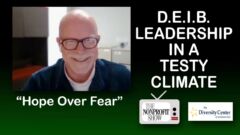
In a conversation as timely as it is timeless, we welcome Gordon Sims, Director of Development at the Diversity Center of Northeast Ohio, to explore how nonprofits can sustain their commitment to DEIB (Diversity, Equity, Inclusion, and Belonging) amid increasing societal and political scrutiny. Joined by cohosts Wendy F. Adams and Julia Patrick, this dialogue doesn’t flinch from the complex realities of today’s climate—but it also doesn’t surrender to them.
Gordon traces the DEIB movement's lineage back nearly a century, when Catholics and Jews united to counter hate, showing that “this movement and this work is far bigger than this political cycle.” His words remind us that while terminology and tactics may shift, the core intention remains: equal access, safety, and dignity for all. "The intent really was never to create preferential treatment for anyone,” he says, “but to just give equal treatment and opportunities."
This conversation acknowledges how the DEIB landscape has been reshaped by fear, legislation, and misinformation. Yet it offers clarity and resolve. Gordon uses a poignant metaphor comparing DEIB to theme park "fast passes," where historically marginalized communities have been left to wait in line while others bypassed them. DEIB, he emphasizes, is about giving everyone the opportunity to get on the ride—no more, no less.
Equally compelling is the discussion around strategy. Gordon highlights the importance of language, framing, and tone when approaching these issues, especially in environments where such topics are misunderstood or even banned. “Sometimes we have to choose between being right and being strategic,” he shares, quoting trainer Erica Merritt. The challenge lies in advancing the work without triggering defensiveness or political backlash.
Ultimately, this episode is about courage, compassion, and connection. It's about listening deeply, creating safe spaces, and convening in strength. Whether it’s through roundtables with LGBTQ centers, school districts, or town hall-style block parties, Gordon and his team are modeling how collaboration itself becomes a form of resilience.
For those unsure how to proceed or afraid to speak, this episode provides a framework not just for advocacy, but for hope. Follow the ongoing conversation at #TheNonprofitShow
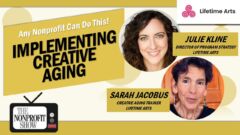
Julie Klein and Sarah Jacobus from Lifetime Arts take a deep and inspiring dive into the transformative world of creative aging. As America's population shifts, nonprofits must adapt—and creative engagement is an exciting and necessary path forward.
Together, they break open the outdated, medicalized view of aging and replace it with a vision where creativity, choice, and social connection are seen as core elements of a vibrant older life. They explore how creative programs provide empowerment, reduce isolation, and foster new identities for older adults—a dynamic shift nonprofits can't afford to ignore.
Julie Klein, Director of Program Strategy at Lifetime Arts, passionately describes the organization’s mission: “Our goal is to weave creative aging into the fabric of our communities.” She shares her personal journey, rooted in childhood experiences of writing plays for her grandparents, that fueled her dedication to bridging generations through creativity.
Sarah Jacobus, Creative Writing Trainer, reflects on her own pivot into this field, especially during COVID, sharing: “Being in a creative aging class is really establishing a new sense of identity—one that’s empowering and energizing.”
The conversation also tackles the nuances of gender differences in participation, the need for thoughtful partnerships, the silent influence of ageism, and the exciting expansion of training opportunities for nonprofits of all kinds—even unexpected ones like botanical gardens.
This episode will challenge you to ask: Are we ready to serve an aging population creatively, inclusively, and dynamically? Follow the ongoing conversation at #TheNonprofitShow
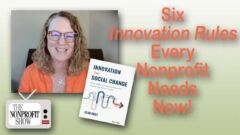
Leah Kral, social impact consultant and author of Innovation for Social Change, joins cohosts Julia Patrick and Sherry Quam Taylor for a spirited deep-dive into how nonprofits can rethink innovation—no Silicon Valley badge required!
Leah sets the tone early, challenging the misconception that innovation is only about gadgets and tech. “Innovation is simply finding new and better ways of doing things,” she says, reframing it as a mindset accessible to nonprofits of every size. Whether it’s Habitat for Humanity’s volunteer model or a legal aid clinic swapping clipboards for iPads, she insists, “People are innovating all the time in the nonprofit sector—they just don’t always realize it.”
Throughout the conversation, Leah shares why many nonprofits feel stuck: good intentions clouding decision-making, risk-averse leadership, and the pressure to produce “glossy” reports with no room for trial-and-error. She offers a refreshingly realistic take—yes, failure might happen, but so might wild success. “It’s far better to fail fast and fail small than never experiment at all,” she notes.
Leah introduces her six principles of innovation: think like a detective, ask courageous questions, empower frontline workers, leave room for experimentation, pursue continuous learning, and master the art of persuasion. She backs each with vivid examples—from the night staff at Mayo Clinic improving patient care, to the global success of WorldReader’s mobile reading app born from failed Kindle pilots.
Cohosts Julia and Sherry echo the importance of curiosity and culture, with Sherry noting, “A curious leader sets the tone for the whole team.” Leah agrees and highlights that personal innovation is just as vital as organizational change.
What’s the biggest takeaway? Innovation isn’t a luxury—it’s essential. And it starts with making space for curiosity, iteration, and the courage to try. Leah wraps with a compelling call: “You don’t need a huge budget to innovate—just a little time and a willingness to ask better questions.”
Whether you're a grassroots nonprofit or a national leader, this episode might just be the reboot your strategy needs. Follow the ongoing conversation at #TheNonprofitShow
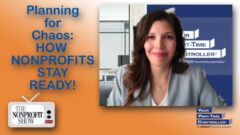
In the dynamics of nonprofit leadership, few challenges loom larger than the compounded weight of natural disasters and abrupt policy changes. Director Jennifer Banks of Your Part-Time Controller delivers a strategic and emotionally grounded perspective on preparing for the unpredictable. Drawing from her front-line experience during the Southern California wildfires, Jennifer guides nonprofit leaders through risk management tactics that go beyond spreadsheets and budgets.
"Risk is just... the likelihood that something bad is going to happen," Jennifer calmly asserts, offering a crucial reframing that invites transparency and proactive planning. Nonprofits across the country have felt the dual pressure of environmental disasters and shifting political mandates. For instance, Executive Order 14173—a federal action targeting DEI efforts—has sent shockwaves through corporate philanthropy, causing organizations to recalibrate their messaging and funding strategies.
Jennifer recounts real-world disruptions, from displaced executive directors to diverted funding streams, showing how interconnected disasters and policy shifts can devastate even the most well-managed organizations. One chilling example: “We had some Fortune 100 companies say, ‘We support your mission, but due to federal contracts, we can’t use DEI language.’” The implications are massive—not just for program funding, but for organizational identity.
To mitigate these pressures, Jennifer recommends regular scenario planning, asset protection strategies (including intangible assets like brand and IP), and a cultural shift toward inclusive financial education within teams. Her advice is both calm and actionable: use this moment of stability, however fleeting, to prepare. That includes stress-testing budgets, securing lines of credit when the balance sheet is strong, and educating all levels of staff about financial realities.
So striking is Jennifer' closing insight—a personal reflection that feels universally true: “You can’t take things for granted... We just can’t get complacent.” Whether grappling with fires or federal funding uncertainties, the message is clear: strategy starts now, not when disaster strikes.
#NonprofitStrategy #CrisisPreparedness Follow the ongoing conversation at #TheNonprofitShow
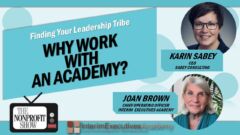
this informative discussion of the most misunderstood yet increasingly vital roles in the nonprofit world: interim leadership. Featuring powerhouse guests Joan Brown, Chief Operations Officer at Interim Executives Academy, and Karin Sabey, CEO of Sabey Consulting, the conversation explores why ‘the interim profession is no longer a placeholder, but rather a strategic, transformative force’. From transparent communication with staff to preparing organizations for thoughtful succession, this episode reveals why professional interims aren’t just leaders—they’re lifelines. And if there’s one thing we need in today’s shifting nonprofit landscape, it’s calm within the chaos.
Gone are the days when an “interim” simply kept the lights on. Joan begins with, “We’re at this exciting opportunity to really better define the profession and better define it as a standard of practice.” Interims today are trained professionals who guide organizations through times of transition with precision, empathy, and results-driven methodologies.
Karin paints the role as a “palate cleanser” between leadership tenures, providing organizations with a fresh start—regardless of whether the previous leader left in celebration or crisis. “A long-term leader may have a lot of institutional knowledge stored in their head,” she explains. “An interim helps reset the table for the next leader.”
The duo dig into the details of the importance of methodology and diagnostics, likening it to a toolbox or even a box of Legos. “You can build a house or a spaceship,” says Karin, “depending on what the organization needs.”, pointing out how this kind of customization is key to stabilizing and uplifting organizations during pivotal times.
And what about board understanding? Both Joan and Karin agree—it’s minimal. “Almost no one understands the concept,” Joan shares plainly. But that’s also the opportunity: to educate, align, and inspire boards to embrace what an interim can truly offer. When done right, it’s not just about keeping the ship afloat; it’s about course-correcting, empowering staff, and setting the next leader up for success.
#InterimLeadership #NonprofitStrategy #LeadershipTransitions Follow the ongoing conversation at #TheNonprofitShow
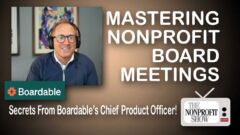
In the ever-evolving world of nonprofit leadership, one constant remains: the board meeting. Whether you're a seasoned executive or a new board member, mastering this essential component of governance can elevate your mission and impact. Cody Bender, Chief Product Officer at Boardable, joins us to unravel the practical strategies that make board meetings more efficient, inclusive, and effective.
With over a decade of experience leading tech product innovation, Cody begins with the importance of meeting preparation, record-keeping, and adapting to change. But more than that, he reminds us that streamlining meetings isn't just about saving time—it's about maximizing mission delivery.
“A well-crafted agenda is easier than you think,” Cody shares. “Structure it from moment one to moment two to moment three—and let your goals guide you.”
Cody’s key advice includes involving multiple stakeholders in creating agendas to line up expectations and foster engagement. He also points to the value of clear, clean formats over outdated templates and visual clutter.
For today’s nonprofits—where hybrid meetings & digital communication are the norm—accountability and access to records matter more than ever. “Don’t let form override function,” Cody tell us. “You can keep the greatest records in the world, but if you can’t get to them, you’re in no better position than if you didn’t do it at all.”
From embracing shared platforms to avoiding the pitfall of overloading your board with too many tools, this informative conversation will give you many actionable items you’re your nonprofit can use. And when you hear about Boardable’s origin story, rooted in the real frustrations of board service, Cody brings a grounded, user-focused lens to the technology.
Ready to transform your board meetings from mundane to mission-aligned? Watch this episode now and you’ll realize smarter, more supportive board practices.
#NonprofitLeadership #BoardManagement #DigitalGovernance Follow the ongoing conversation at #TheNonprofitShow
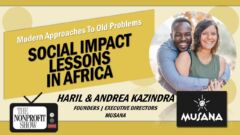
In a world often clouded by complexity, some journeys stand out as beacons of transformation and hope. This is the story of Andrea and Haril Kazindra, two young visionaries whose lives were forever changed by an internship and a friendship in Uganda, sparking the birth of Musana.org, an organization rewriting the rules of charitable giving.
Andrea, just 20 and fresh from Colorado, found herself confronted with harsh realities in a Ugandan orphanage: children starving, stealing, and facing unimaginable hardships. Moved by the shocking discovery of corruption exploiting children's suffering for profit, she knew her path had changed forever. "I called my parents, I told them I'm not coming home—I'm staying to rescue these kids," Andrea shared passionately, and signifying the depth of her commitment.
Meeting Andrea was transformative for Haril, too. He says, "Learning about her compassion and love for these children and wanting to fight for them to have a better life—that's what really touched me the most." Together, they uncovered a staggering truth: 80% of kids in orphanages worldwide aren't orphans but rather products of systemic poverty and exploitation.
Realizing charity alone was insufficient, Andrea proffered, "Charity is not going to develop Africa. Business, enterprise, industry, investing in local people—that’s truly going to create impact.” This philosophy guided their innovative model that has now educated over 8,700 students and provided healthcare to hundreds of thousands of patients through community-built schools and hospitals, driven entirely by locally-generated income.
Their story isn't just one of success—it's a profound reflection on humility and empowerment. Haril shares, "If people can overcome egos and pride, a lot can be accomplished," underscoring their approach of mutual respect, cultural exchange, and local empowerment.
Now, Musana's radical mission addresses root causes of poverty by investing in sustainable enterprise, not dependency. Andrea powerfully re-affirms their core philosophy: "Charity has not developed any country—it’s business, enterprise, and industry that will create lasting change."
The lessons from Musana challenge conventional philanthropy and call us to rethink our approach to global aid, emphasizing dignity, sustainability, and local ownership.
#SocialEnterprise #CommunityEmpowerment #UgandaNonprofits Follow the ongoing conversation at #TheNonprofitShow
